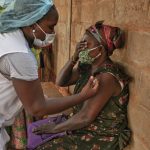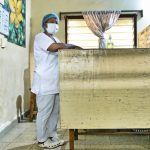To accompany the chaos and uncertainty described in AJ’s poems, we’ve used a photo by JC Johnson that isn’t technically a good photo. Taken in Budapest, Hungary, it’s the result of a camera that isn’t stabilized and a subject that’s moving too fast for the camera to capture in-focus. This usually happens in error, unintentionally—even to experienced photographers. Expert photographers don’t normally show such images to the public.
A COLLECTION BY AJ JOHNSON
One of the things living in France has taught me is a story of America’s greatness as seen from the outside. The way France’s newscasters cover our elections with careful explanations of the electoral college and graphics showing states turning blue or red. The way the world is attuned to our leaders’ every pronouncement, because those pronouncements will affect it. The way I can have in-depth conversations about American politics with non-Americans abroad because tracking the affairs of the global power broker matters to them.
Life in France has also taught me that the U.S. did not exit the womb as a superpower, however otherwise our American-exceptionalism history classes might lead us to believe. As I toured a WWII museum last year on the Normandy land American bodies helped liberate, I learned that still-young America took its place among the world’s most powerful nations only a couple generations ago, by stepping outside our borders to aid the outside-world in just causes. My years of school and reading inside America didn’t teach me that we had to earn our superpower status. In the stories I learned growing up, we have been a main character since our beginning.
These French lessons have hit home again more recently as I’ve listened to how everyday people living in France are following current events in America, questioning how these events will impact them, though they live close to the ground and far from political power games.
Our team had been wondering how Anthrow Circus might tell this story, the outside-America American story. Then AJ Johnson wrote that he’d been working on this collection of poems. From his vantage point in tiny Togo, in West Africa, with his regional travels and work for various American nonprofits thrown upon the panorama from which he writes, AJ gently narrates chapters in America’s story as they’ve been written so far in 2025. These careful words reinforce what living in outside-America has taught me, that as goes the ancient proverb that Spider-Man popularized, “with great power comes great responsibility.”
We’re publishing this collection in a two-part series, four poems each. (Part 2 of the collection lives here.) Listen to the voices AJ brings us. What can America learn about itself from outside-America? How should America spend its great power and great responsibility?
—Kami Rice, Anthrow Circus editor-in-chief
Ashes in the Archive
The sun blinked out
behind the Capitol,
not in anger,
but in the slow dismay
of a father watching
his son walk
into a storm
he cannot stop.
They called him czar,
called him comet,
called him cutthroat—
but still, the President kissed his forehead
in front of the press
like a soldier being sent
to an unmarked war.
We watched the DOGE
fold into itself,
like smoke coiling
into the breath
of a bird who knows
no song will keep
the fire from returning.
You came
to drain the fields
of waste and words,
to bend time toward efficiency,
like iron smelted for speed,
cutting ribbons from red tape
while the air
choked on its own paperwork.
A child drew your face
on the back of a receipt—
labeled it: man who deletes the stars
to save daylight.
And still,
they did not thank you.
$160 billion
in harvested silence—
how many homes
does it take
to feel holy?
And what of the dismantled cities
of aid and hope,
the laid-off letters
sent like seeds
into a windless field?
You walked
with ghosts trailing your shadow—
not ghosts of the past,
but of futures
never funded.
Still, Trump grinned—
offered the stage
like a farewell tour
of a half-built temple.
He called it
legacy.
You didn’t bow.
You didn’t burn.
You vanished,
like fog
remembering water.
What was left?
Only the glint of a pin
in a lapel,
the smell of paper
catching heat.
Let them debate
what it meant.
Some departures
are not resignations,
but reckonings.
Some men don’t leave
until they take
the silence
with them.
Stamped, Sealed, Vanished
by an Afghan Refugee Sent Back Home
I still carry the paper
creased and warm
from too many hands—
that letter with the eagle in the corner,
its wings open
like it once meant sanctuary.
DOGE,
they called it.
But to me, it was a doorway—
a thin space between fear
and forgetting.
They said
he wanted to clean the system,
make it lean,
pure, efficient—
I wonder what that means
to a man who’s never
washed blood from a child’s shirt
with no soap.
My caseworker, Anne,
wore her empathy like armor.
She said my file
was almost there—
just one more round
of signatures,
just one more box
to be ticked
by a man who speaks
in rockets and revenue.
But then DOGE
went quiet.
The phones didn’t ring.
Anne vanished
like a shadow pulled under a door.
I stood at the checkpoint
with a folded jacket
and the echo
of her last voicemail:
we’re doing everything we can ….
When they put me
on the plane,
I watched the map
like a wound that spreads.
Now Kabul
is not a city
but a memory bruised daily.
The same soldier
who tore my cousin’s ID
asks if I am grateful
to be home.
Home?
There is no room left
in the sky
for my prayers.
Even the stars blink out
like rationed hope.
They said
he left to save money.
What is the cost
of a mother crying
in a cold room
because her daughter
was denied
the right to begin again?
I hear he still advises—
still whispers
into the ear of the President
like a god of numbers
speaking over the noise
of need.
I wonder
if he knows
that sometimes
efficiency
is a knife
without a handle.
We bleed
on both ends.
Ward 9B Doesn’t Exist Anymore
Voice of a Veteran After the Closure of His VA Hospital
They packed it up in May.
The nurse who remembered my daughter’s name.
The janitor who’d served in Desert Storm.
The black plastic clock that buzzed 5 minutes slow—
even that was pulled from the wall
like it had betrayed the cause.
Ward 9B doesn’t exist anymore.
Just the echo of shoes,
the smell of antiseptic holding hands with dust.
No more group therapy.
No more Marvin’s off-key gospel hum.
Just locked doors.
A sign on the gate that says
Veterans Affairs Region Consolidated.
Please visit our main branch
43 miles north.
My legs don’t go 43 miles anymore.
I watched a man who’d lost his legs
drag his wheelchair to the bus stop.
He said it’s easier to die in pain
than in silence,
but somehow
we’re doing both now.
I wake up
and try to count how many pills I have left.
I used to count how many pushups I could do.
Now I count
how many times they forgot
the sacrifice was not in signing up—
it was in being signed off.
They tell me
this is the price of running lean.
But I ran lean in Fallujah.
I ran lean through sandstorms and bullet fog.
And no one shut me down
because I was too expensive.
Ward 9B doesn’t exist anymore.
But I do.
And I wonder
how long I’ll be allowed.
When the Trees Stopped Reporting
Voice of an Environmental Activist After DOGE Cuts to the EPA and NOAA
We used to wake early
to catch the satellites
singing the temperature of the seas,
the ozone’s whisper,
the way the wind gathered its thoughts
above the coasts of Louisiana.
Now, silence.
Not the silence of peace,
but of unplugged sensors,
of canceled grants,
of a sky blindfolded
by a man who calls carbon
a hoax and the hurricane
a conspiracy.
They say the data was too slow,
too expensive,
not fast enough to earn its keep.
But what value
does a coral reef need
to stay alive?
We buried our forecasts
under shredded contracts,
under the dust of dismantled labs
where graduate students once
named storms like children—
delicate, unpredictable,
worth watching.
We lost the birds
before we lost the funding.
But now we lose the watchers, too.
I pass by the ranger station
where they used to log rainfall
by hand—
someone drew a frown face
on the rusting NOAA seal.
I still listen.
The trees still speak
in heat and migration.
But no one prints their voices
in journals anymore.
I’ve stopped bringing petitions.
Instead, I bring questions
to the river:
Will they only believe
when the ash
spills into their own wine?
Will they call it disaster
only after it claims
their golf courses and
beachfront villas?
The forest is not angry.
It’s just tired of explaining.
And I—
I don’t scream anymore.
I plant.
Quietly.
Every seed
a sentence in a language
they refused to learn.
AJ Johnson is a freelance photojournalist and faith-based storyteller with over 10 years of experience reporting on culture, Christianity, and social change across sub-Saharan Africa. A trained sociologist, he has contributed to The Media Project, Anthrow Circus, and Christianity Today. He leads the African Child Photo and Film Project in his native Togo and is passionate about equipping youth to tell their own stories through photography and journalism. Beyond the lens and the field, AJ is a developing creative writer and poet. His creative work explores themes of justice, identity, freedom, and faith—offering fresh, authentic perspectives rooted in African experiences. He is currently working on several books and poetry collections designed to inspire, challenge, and amplify underrepresented voices in Africa and beyond. AJ’s work blends investigative depth with poetic insight, shining a light on stories often overlooked by mainstream media. Whether crafting a verse, capturing a moment through his camera, or mentoring young storytellers, he is driven by a vision to inform, inspire, and ignite redemptive change. AJ is fluent in the Ewe, Mina, and Anlon languages of West Africa as well as French and English.






